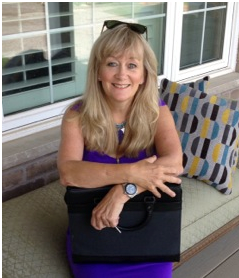
Absence of words does not mean lack of presence
When one is accustomed to continuous chatter, the hollow sound of silence becomes deafening…
We were always a family of conversationalists. I think this was a refined way of saying we talked a lot. To become a true part of the inner family circle, it was important to be engaged in more than one conversation at a time, and to change topics with fluidity. I believe the prospect of silence was uncomfortable for us, and we compensated by talking loudly and volleying banter.
I think this perception of “normal communication” led our family to detect changes in mom’s conversational skills some time before she was diagnosed with dementia. At first, she became stalled; a word would escape her grasp, and then it would vanish before she could retrieve it.
Later, her stories became woven with threads of fact and fiction, but they were real to her and that’s what mattered. Her captivation of the listener brought her pleasure because she had purpose and value.
Sometimes a topic became a repetitive regurgitation of a story or phrase that seemed to be caught in a spinning vortex. During these moments she seemed blissfully unaware or snagged tightly in a knot of anxiety because there seemed to be an underlying sense of unfinished business.
Her mood changed from positivity to indignation when she perceived a wrongdoing or slight. At those times, the undoing of the injustice was as volatile as the outburst. She was also loving, caring, and funny, and her faith in her own spirituality was steadfast.
As time passed, mom was challenged with further communication losses, and there was almost an instinctive urge to assume her voice to protect her. In reality, she had a valid and important point of view that still needed nurturing and respect.
When she was unable to verbally communicate, I noticed that caregivers and visitors spoke “around her” and not “to her.”
I found the best way to advocate and educate was to write from her perspective because “absence of words does not mean lack of presence.”
I AM Listening
Words like swirling leaves around me,
Dancing near to tantalize,
Falling just beyond my reach,
I beckon them to linger closer.
Whispered comments fill my presence,
As if my mind does not detect,
The essence of the raw emotion
Of tender memories.
Despair not by my side however,
For this reflection somewhat clouded,
Is only just a mirrored image,
Where spirits deep defy detection.
Waiting for your story silent,
Those treasured moments once revealed,
Longing for your present journey,
For I am listening quietly.
Talk to me as once we could,
With cares and joys and sorrows living,
Although I may not seem to know,
I am and always was.
Years later, after my mom was diagnosed with Alzheimer’s disease, I became a Family Support Counselor and Educator at the Alzheimer Society of Niagara Region. I am a Registered Nurse, and although my medical experience qualified me for these roles, the personal, raw emotion of living so closely to this disease was my true teacher.
I now have my own platform and continue to share her stories, educate individuals living with dementia and their families and help seniors navigate through the complexity of the healthcare system.
Here are some tips that may support communication when an individual is living with dementia:
• Be a patient, nonjudgmental listener. Avoid correcting details. Active listening is the ultimate transference of acceptance, love, and respect. Be mindful of the receptiveness of your body language and tone.
• Guide the conversation when there is repetition. Nudge the conversation forward by introducing a new topic, reminiscing, or offering reassurance through gentle touch and tone to allay anxiety.
• Be aware of the impact of environment. Conversations are always better when a person has had their physical needs addressed (bathroom, warmth, hunger, comfortable seating etc.). Minimize noise, distractions, and insure assistive aids are in place (glasses, hearing aids etc.).
• Create new memories and relive old ones. Bring items to help with reminiscing. Pictures, and familiar items that stimulate sight, touch, and memories.
And above all remember, a disease does not define us…
January is Alzheimer Awareness and we are encouraging Canadians to be there for people living with Alzheimer’s disease or another dementia. Learn more.
 Ann Chartier has been a practicing Registered Nurse, for almost 4 decades. As the founder of Elderpilot.com she advocates for people living with dementia
Ann Chartier has been a practicing Registered Nurse, for almost 4 decades. As the founder of Elderpilot.com she advocates for people living with dementia
and assists Seniors navigating LTC and Retirement Homes.
Ann was a Family Support Counselor and Education Lead/Writer with the Alzheimer Society Niagara Region. (2012-2015) She continues to be a guest speaker,
Alzheimer Society Volunteer and shares her stories from the eyes of a care advocate for her mom.